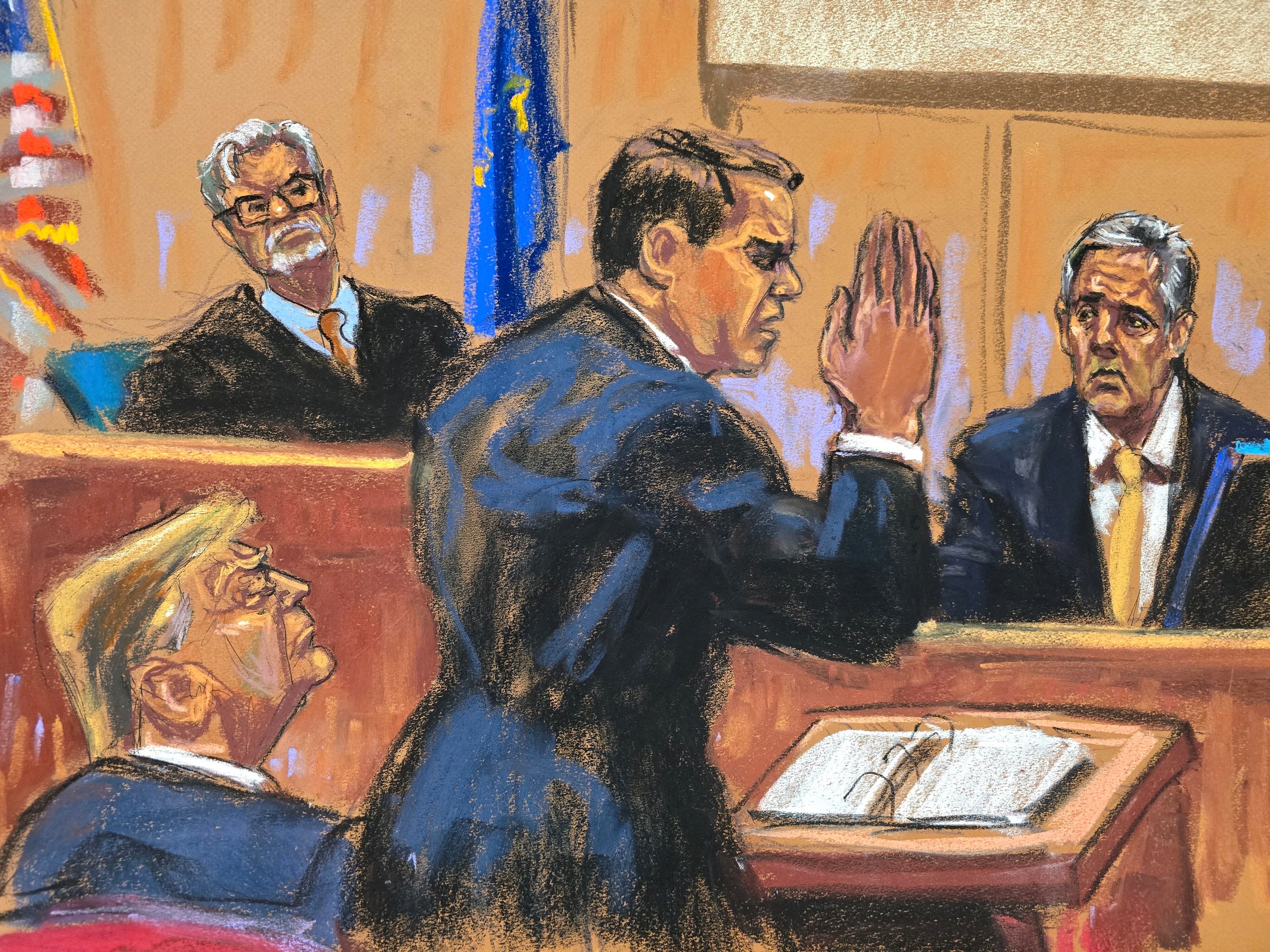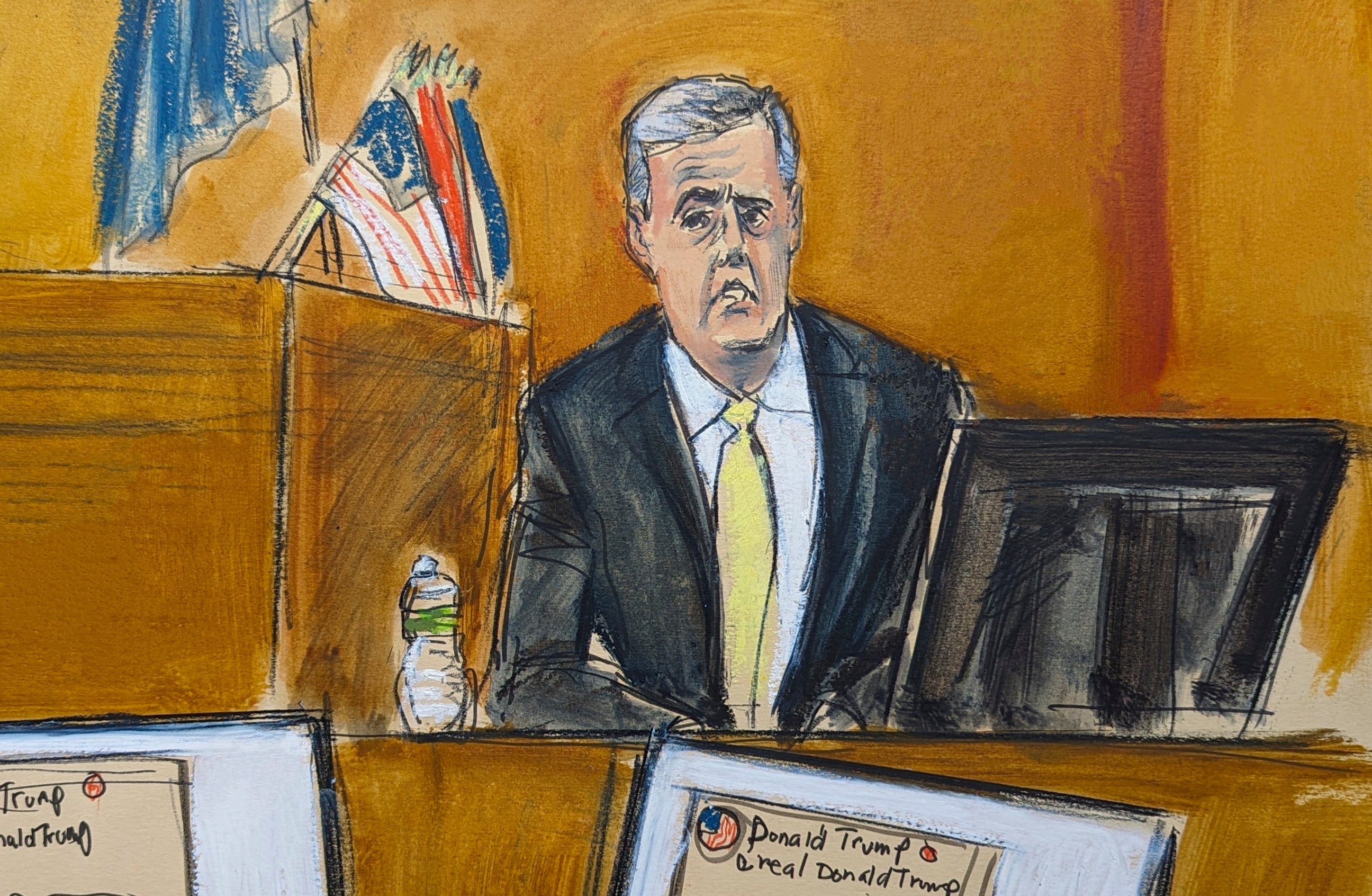Trump team claims Michael Cohen ‘collapsed’ under cross-examination but is that really the case?
While Trump allies claim the former fixer’s credibility was undermined, legal experts play down the significance of a ‘critical call’ at the center of defense attacks
On Thursday, the jury in Donald Trump’s criminal hush money trial heard how his former “fixer” and attorney Michael Cohen was bombarded with prank calls in the run-up to the 2016 presidential election.
It was Cohen’s complaint of these calls to Mr Trump’s bodyguard Keith Schiller in a 24 October 2016 phone call that Mr Trump’s attorney Todd Blanche used to try to undermine Cohen’s prior testimony as part of a fiery cross-examination.
The one-time Trump loyalist turned nemesis had previously testified that it was on that call that he told the then-2016 presidential candidate he had secured the $130,000 hush money deal to bury Stormy Daniels’ story about having sex with Mr Trump in 2006. The phone conversation that night lasted just one minute and 36 seconds.
While Cohen remained calm on the witness stand, Mr Blanche screamed accusations at him that he was lying to the jury about the contents of that call – suggesting that the prank calls alone were likely discussed.
Cohen meanwhile maintained that he believed he spoke to both Mr Trump and Mr Schiller on the phone – and insisted that the hush money deal was part of his discussion with the future president that night. Cohen has previously been convicted of perjury but defends himself from that accusation by noting he lied to protect Mr Trump.
Supporters of Mr Trump have framed this exchange as a victory for the former president that undermines the prosecution’s entire case regarding the 34 counts of falsifying business records in an illegal effort to conceal the true nature of his payments to Cohen: that they were reimbursements for hiding stories of alleged affairs from voters to boost his chances of winning the presidential election.
Mr Trump’s defense has focused its case on undermining the credibility of both Cohen and Ms Daniels while cross-examining the two witnesses at the heart of the case.

“Michael Cohen, I believe, has just completely collapsed on the stand under withering cross-examination by president Trump’s trial team,” attorney Will Scharf said on Fox News Sunday.
“So, at this moment, I don’t think there’s any further need to call into question Michael Cohen’s credibility, because I think he has none.”
“I think any fair jury reviewing the record, would immediately and unanimously vote to acquit,” Mr Scharf, a Republican candidate to be Missouri’s attorney general, said.
“In terms of whether witnesses will be called, including president Trump, that’s something that the defense team is going to have to think about after the prosecution rests. But as of now, to me, this looks like a directed verdict or at the very least, an absolute acquittal just based on the prosecution’s total failure to prove anything, even approximating the crime.”
However, over on MSNBC’s Inside with Jen Psaki, former Assistant US Attorney Andrew Weissmann dismissed the significance of the call between Cohen and Mr Schiller.
He explained that it is usual for the defence to find a mistake by a witness or the district attorney’s office and characterise it as a lie — it’s their job to cast doubt in the minds of jurors. Mr Weissmann continued by saying the response from prosecutors will be to establish whether it is a lie or a mistake during redirect.
“I think it was a mistake, and it’s not the end of the world, because there is so much other evidence, and if you were going to lie about something, this would not be the phone call,” said Mr Weissmann.
“A lot of people on air are saying this was a critical call ... This is not the critical call, if there’s a critical call it’s two days later, which the phone records make absolutely clear — Michael Cohen had two lengthy calls with the former president.”
Roger Parloff, senior editor of Lawfare, went into further detail around whether the cross-examination of Cohen was quite as bad for the prosecution’s case as some have made out.
Cohen may have “misremembered” a call to Mr Schiller on the evening of 24 October 2016, believing he spoke to Mr Trump about Ms Daniels when he instead or additionally spoke to Mr Schiller about the 14-year-old prank caller.
However, Mr Parloff explains in a thread on X that there are other facts the jury knows and will be reminded of during redirect questioning or in closing arguments.
First off, on the same day as that call, Cohen exchanged the first in a series of frantic Signal calls with AMI chief executive David Pecker that continued for two days.
National Enquirer editor Dylan Howard also had a flurry of exchanges with Cohen starting the following day: “We have to coordinate something ... or it could look awfully bad for everyone.”
Neither of these conversations is about the prank caller. Instead, Cohen testified that he was trying (but failing) to convince Mr Pecker that AMI should pay the $130,000 hush money to Ms Daniels — as Mr Pecker already stated in his testimony.
Over those same few days, Cohen had a series of calls with Trump Organization CFO Allen Weisselberg, the last being on 25 October after hours and lasting approximately three and a half minutes. The next morning Cohen spoke with Mr Trump twice and it was in those conversations that he testified they talked about setting up a way to pay Ms Daniels off.
Mr Parloff continues to explain that, shortly after the second call, Cohen reached out to get the corporate records he needed to open a bank account for Essential Consultants, a Delaware LLC he’d set up earlier that month to pay Ms Daniels.
Later that morning, Cohen’s banker asked for confirmation that he wanted to withdraw $131,000 from his home equity line of credit and deposit it into his checking account. Then after lunchtime, Cohen lets Ms Daniels’ lawyer Keith Davidson know that the funds were in his account and are about to be wired over.

Early the next morning (27 October 2016), Cohen demanded and received assurance from Mr Davidson that he wouldn’t disburse funds to Ms Daniels until she had signed the non-disclosure agreement. The wire transfer from Cohen to Mr Davidson then went out at about 10am.
The NDA and the side letter identifying “Peggy Peterson” as Ms Daniels and “David Dennison” as Mr Trump were signed on 28 October with Cohen signing on behalf of his boss. Shortly before midday, Cohen and Mr Trump had a five-minute phone call.
Also entered into evidence, as Parloff notes, is the bank statement showing again, the wire transfer of 27 October 2016 but with Weisselberg’s handwriting in the left corner — from the following January — describing the convoluted way Mr Trump would reimburse Cohen, grossing up the payoff to conceal it as income.
As Mr Parloff says: “Maybe it’s just me, but I think Blanche’s Perry Mason moment may prove less devastating than many commenters seem to think.”
Bookmark popover
Removed from bookmarks